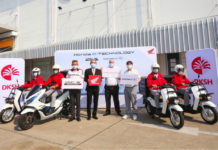New business is happening
In what can only be seen as a positive sign for the longer haul in the Thai economy, the Business Development Department recently released figures which showed a modest one percent year-on-year increase in new business registrations.
While one percent is hardly a reason to get excited, it does, nonetheless, reflect the fact that there are plenty of people prepared to take the plunge into starting a business venture in the current economic climate.
The Business Development Department has said it hopes to see between 60,000 and 65,000 new registrations logged in during 2016, and the first quarter figures suggest the end result will be very much in line, if not above, the projections.
Those first quarter numbers showed 17,523 new businesses registered. While, as mentioned, that figure was only one percent over the year-on-year figures, the value of the registered capital of these businesses came in at 28 billion baht. This is a significant 57 percent increase on the previous years’ first quarter, and, arguably, reflects a substantial optimism in the business landscape of Thailand in the near future.
The Business Development Department acknowledges the strong tourism numbers are helping the drive towards new registrations, as is the government’s spending on infrastructure.
What is also pleasing about the registration numbers is that March was the strongest of the quarter, with 6,176 new businesses registered with 27.3 billion baht in capital, a whopping 70 percent jump on the same time frame in 2015.
The numbers also represented the first time new business registrations had exceeded 6,000 since August 2013.
The Business Development Department said the majority of new registrations were in the general construction, real estate, machinery sales, food/restaurant and business consulting sectors.
Overall, as at the end of March, Thailand had 1.32 million registered businesses with a combined registered value of 20.1 trillion baht. Of these, 631,195 businesses were still operational, with registered capital amounting to 15.71 trillion baht.
According to other reports, the government implemented seven specific measures between September last year and the end of January this year aimed at stimulating the economy, worth a total of 468.854 billion baht. By the end of December last year, the government and its agencies had disbursed 198.081 billion of this budget.
Despite the promising results, the government introduced another two key economic stimulus measures in February: housing loans for low-income earners, to a figure of 30 billion baht; and 93 billion baht in soft-loan measures to reduce the impact of the drought on farmers through the Bank for Agriculture and Agricultural Cooperatives.
The National Economic and Social Development Board has stated the remaining amounts available to be disbursed through the rest of this year should help ease the impact of slow economic growth on low-income earners and the drought on farmers.
Economic growth is expected to fall between 2.8 and 3.8 percent for 2016.










